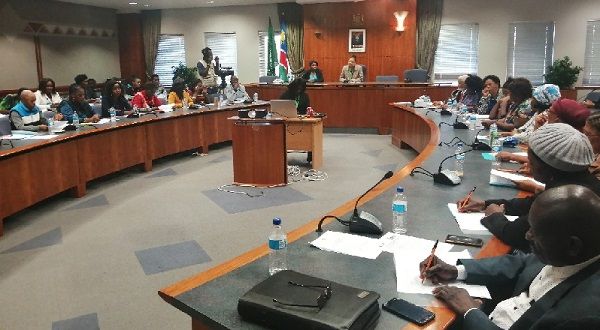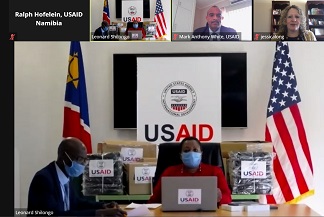
ICT ministry asks rural women parli what must be done to harness the power of technology for rural communities

By David Adetona.
Technology penetration in rural communities was recently assessed by the Ministry of Information and Communication Technology in an attempt to identify the basic need for technological enablers to improve the quality of life in rural communities.
Partnering with a group styled as the Rural Women Parliament with Male as Partners, the ministry looked in particular at the utility level of such technologies as the internet, computer usage, smartphone usage, online media, email correspondence and other digital devices. The assessment was done in response to a request from the National Council.
Officials from the ministry interviewed members of the Rural Women Parliament and their partners as a first step to drafting a needs assessment. This was done by way of a standardised questionnaire. The project was conducted under the guidance of the ministry’s Director of Audio Visual Media, Ms Roselia Penda, during a session of the Rural Women Parliament in the chambers of the National Council.
“The MICT included the assessment as a target activity for Ministerial 2019/20 annual plan implementation of the overall outcome of the Information and Communication Technology training to be conducted eventually. Therefore, the Honourables are to provide information by completing an attendance register that will be developed into skills profile for the participants, while the completed training needs questionnaire that will be analysed in order to identity and assist in creating a customize participants needs based course and scheduling of training session, as well as identification of training partners and sponsors,” she explained.
She said that the assessment was endorsement by the report of the Second Session of the fourth Rural Women Parliament with Male as Partners that was instituted and founded on the recommendation of the report of the Standing Committee on Gender, Youth and Information and Communication Technology.
The assessment was delineated and underscored from the Resolution of the United Nations Commission on the Status of Women (CSW), after the National Council of Namibia attendance of the 62nd United Nations Session of the CSW in New York.
“This assessment will supplement the 2011 resolution of the Status of Women which recommended that governments and parliament to involve grassroots women in social activities with the aim of empowering them to become community leaders,” said Penda.
The purpose of the Rural Women Parliament is to create a forum which offers opportunities for grassroots women and men to access information on socio-economic and political developments and to exchange experiences on how to deal with the challenges in their respective communities.
Director Penda stated that the assessment is vital because the Africa Union (AU) in 2009 declared 2010 to 2020 as Women’s Decade with special focus on ten themes that include working to achieving the education of women in the Information Communication and Technology in Africa.
In the Rural Women Parliament, each region is represented by two women and one male with the mission to create a platform where significant issues of national concern affecting women and others who reside in rural areas can be discussed by understanding parliamentary processes and practices for the implementation of AU and UN declarations.
Many of the representatives acknowledged the value of the ministry’s assessment and the open discussion on ICT, which they said will contribute to the promotion and development of grassroots communities.
They expressed the wish that training, awareness campaigns workshops, seminars, conferences and expos that educate or inform the public about the features and importance of Information and Communication Technology, should continue.
Caption: The Rural Women Parliament with Male as Partners provides local perspective on how to maintain better understanding, access and usage of Information and Communication Technology for the benefit of rural communities. The Ministry of Information and Communication Technology recently conducted a survey during a meeting of the parliament members in the chambers of the National Council. (Photograph by David Adetona).












































